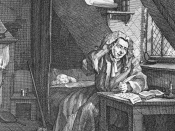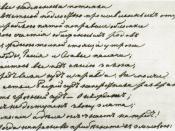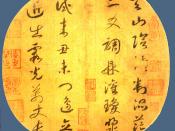Sonnet 73 is clearly addressed to a young man. The poet begins the sonnet with images of autumn to establish what the poet perceives the young man sees as he looks at the poet. The yellow leaves, the bare boughs, the sweet songbirds driven off by winter, together with other grim images autumn, suggest that what has been bright and shining before is now fading away, just as the exuberance of summer is now fading away into the darkness of the winter.
The images introduced later in the poem complement the gloominess of the first quatrain of the poem and convey an even darker sense of something fading and dying. In the second quatrain, the scene changes from autumn to dusk, a day coming to an end. In line five to seven, the poet describes the end of a day, from "twilight" (line 5), to "sunset" (line 6), then finally to "black night"(line 7).
These descriptions, like those in the first quatrain, also suggest that something as bright and beautiful as tge daylight is now slowly vanishing as the twilights shatter, the sun lights an afterglow and the dark night falls. Here, dark night most probably refers to death, and this is supported by line 8, where the poet says "Death's second self that seals up all in rest", which means that the dark image of death is swallowing, sealing up everything bright as in a coffin.
The third quatrain reveals that the poet is speaking not of his physical death, but the death of his youth and youthful desires. This becomes evident when the poet says in line 9 to 10, "In me thou see'st the glowing of such fire / That on the ashes of his youth doth lie", which suggests that his youth is almost burnt out and is now turning to ashes. Here, the burning out of a flame echoes with the dusk of the day, both of which describe something that is ceasing to radiate.
In the couplet of the sonnet, the poet ends by saying that after seeing the fading away of the poet's youth, the young man, to whom the poem is addressed, should love and embrace his youth well, for this is what he has to give up before long.






